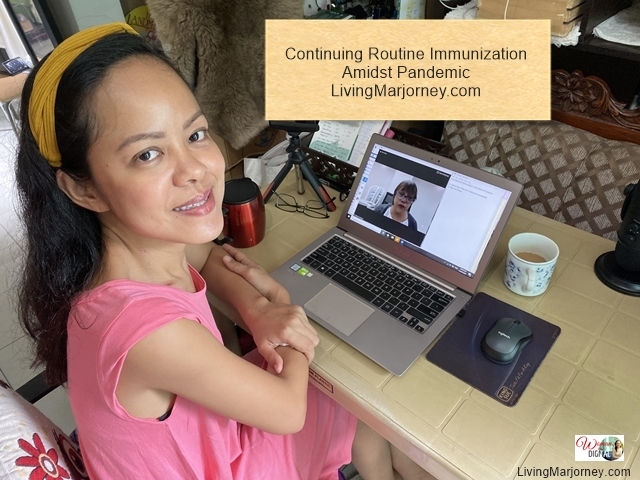While cases of Covid-19 continue to rise, we should not forget other preventable diseases if only immunization is given. Following dengue vaccine scare, some parents refused to bring their babies for the routine immunization and this resulted to a significant increase in number of measles and polio cases last year. Vaccines saved countless lives, preventing an estimate of 2.5 million deaths globally per year. When vulnerable people are not vaccinated, they are at risk of getting disease.
In the recent tele-conference "Kapihan ng Samahang Plaridel" I attended, the doctor/speakers discussed the importance of continuing immunization in the midst of pandemic. They also presented some challenges being faced by the healthcare workers as well as the parents bringing their kids for routine immunization.
Dr. Lulu Bravo said that if we do not vaccinate, diseases that have become uncommon such as pertussis can become ordinary. People are afraid of vaccination because of the risks, the truth is risks related to immunization are very small and rare.
Aside from negatively impacting the health of Filipinos, infectious diseases also damage the country's economy. Vaccines are responsible for the many infectious diseases such as measles, mumps, and influenza.
Here are some recommendations by Dr. Lulu Bravo
1. Parents living under the enhanced community quarantine (ECQ) are advised to contact their health center and/or doctor for child's immunization.
2. Some hospitals provided a room specific for immunization so that well babies will not get in contact with sick babies.
3. It's time we develop a tele-health or tele-medicine to limit face to face consultation. This online doctor's consultation will be part of new normal.
Speakers Dr. Lulu Bravo, Executive Director of the Philippine Foundation for Vaccination, Dr. Mary Ann Bunyi of Pediatric Infectious Disease Society of the Philippines, and Dra. Maria Silva Wilda, DOH National Immunization Program Manager.
Updates on Pneumococcal vaccine
Dra. Silva shared that one of the vaccine-preventable diseases, pneumonia, remains the number one killer disease among children 5 years old and below. The tender for the child pneumococcal vaccine -between PCV 10 and PCV 13 is currently being reviewed by the Health Technology Assessment Council (HTAC) for comparability and cost effectiveness.
Asked on the new evidence presented by the World Health Organization (WHO) saying that the two PCVs in the market are equally effective in protecting the children from pneumonia, Silva said: “When we did the cost effectiveness analysis, they are both cost effective.
The price of PCV10 and PCV13, they fall on that range na cost effective sila pareho. But, of course, there is another benefit when we chose the PCV13 because it contains the three serotypes that are not found in PCV10 before. But now with the new evidence, this was now presented to National Immunization Committee and then it was brought up to the HTAC for further review and we are waiting for the review.”
The PCV tender is massive, which is even bigger than that of the controversial Dengvaxia procurement.
“Currently, there is only one available pneumococcal conjugate vaccine available in the market (PCV 13). It is a very expensive vaccine and its eating up more than 60% of the budget of the national immunization program. Mahal talaga pag isang produkto lang ang nasa merkado, ” Silva said. The HTAC Review of the PCV vaccines is expected to be completed this June.
Dr Maria Wilda Silva, DOH National Immunization Program Manager, leads health workers in the recent launch of the Measles-Rubella and OPV immunization campaign in Region I. Photo from PIA.

















Thanks for all the tips and guidance miss marj..keep safe always.
ReplyDelete